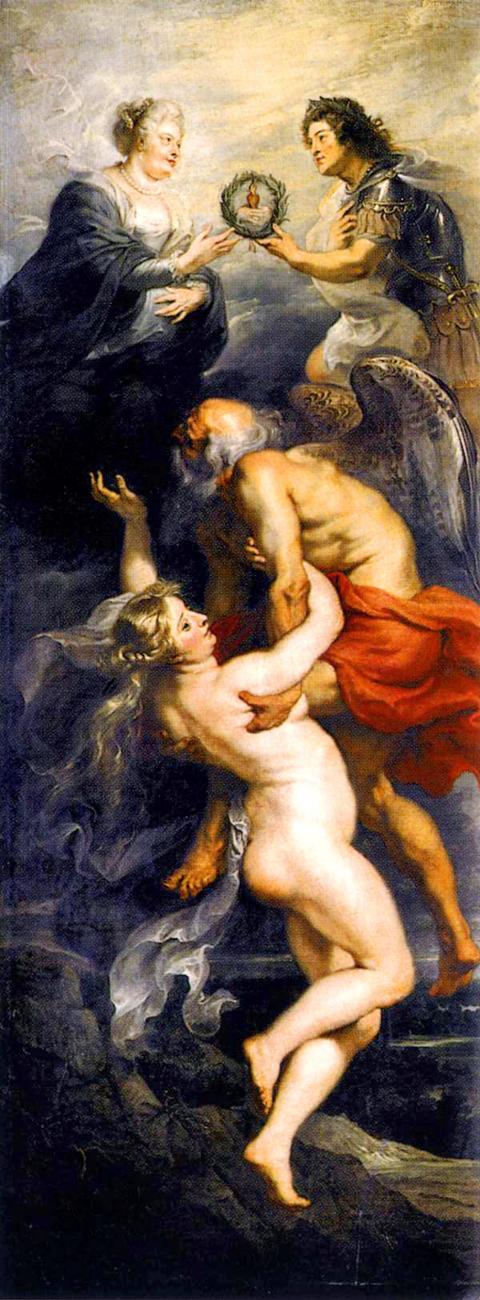Chinese Practice
水落石出
(shui3 luo4 shi2 chu1)

Photo: Wikimedia commons
照片:維基共享資源
as the water recedes, the rocks appear
北宋詩人歐陽修(西元一○○七~一○七二年)筆下的「醉翁亭」,為僧人智仙所築休憩之處,位於今中國安徽省滁縣。歐陽修所寫的〈醉翁亭記〉,便是描寫四季變化的景色──春季野花的幽香,夏季樹木翠綠繁茂成一片濃蔭,秋季風聲蕭瑟、霜色瑩潔;在冬季,水凝成了冰和雪,因此「水落而石出」──水位下降,溪中的石頭故而露出。成語「水落石出」,或源於此。「水落石出」字面意義為水位下降,使原先在水面下的石頭露出,引申為使隱而未顯的真相揭露出來。
北宋詩人及政治家蘇軾(西元一○三七~一一○一年)的〈後赤壁賦〉(西元一○八二年),作於歐陽修死後,文中寫道:「江流有聲,斷岸千尺。山高月小,水落石出。」(河水在千尺高的峭壁間潺潺流過,山巒之高,讓月亮顯得小了,水位降低,讓底下的礁石露了出來。
在當時,「水落石出」一語仍純為描述性的。然而,到了清代,「水落石出」已被當做隱喻來使用,例如劉鶚(西元一八五七~一九○九年)在《老殘遊記》中寫道,「因為你家這十三條命,是個大大的疑案,必須查個水落石出」。
英文中有兩個片語跟「水落石出」所隱喻的意義類似,皆出自英國文豪莎士比亞一五九六年的劇作《威尼斯商人》中的一段對話:「truth will come to light; murder cannot be hid long; a man’s son may, but at the length truth will out」(真相會大白;謀殺隱瞞不了多久;殺人兇手總會被找到)。
此處之意為,如同河底的岩石,即便你可能看不到,但事實總是存在的。隨著時間的推移,遇到了適當的條件,真相一定會被揭露。它可以是一種寬慰──若聽者希望真相大白,或是一種警告──若聽者寧願隱瞞真相。
在現代英語中把「out」一字當做動詞來用或許有些怪,但是現今引用莎士比亞的話說「the truth will out 」,基本上是完全可被允許的。(台北時報林俐凱譯)
他蒙冤死後多年,真相終於水落石出,原來這是一起政治迫害。
(All this time after he was wrongfully killed, the truth has finally come to light. We now know it was political persecution.)
總教練表示,希望在禁藥疑雲水落石出後,外界能重新聚焦在比賽本身。
(The head coach hoped that, after the truth had come out about the doping scandal, everybody would be able to concentrate once again on the actual competition.)
英文練習
the truth will out
The “Old Tippler’s Pavilion,” as the Northern Song Dynasty poet Ouyang Xiu (1007 - 1072) called it, was a structure originally built by a monk named Zhi Xian in Chuzhou, present day Chu County in Anhui Province. Ouyang would later write the Record of the Old Tippler’s Pavilion, in which he waxed lyrical about how the seasons transformed the local landscape. He wrote of how spring brought the wonderful fragrance of wild flowers, summer verdant trees and lush shade, fall the gleaming frost and winter a change in the landscape as water locked up in ice and snow caused water levels to fall, revealing the rocks and boulders lying on the river beds (水落而石出). This essay may well be the origin of the Chinese idiom 水落石出, a metaphorical extension of the falling water level revealing previously submerged boulders, evoking the idea of the revelation of hitherto unknown truths.
In his Second Ode on the Red Cliff (1082), written after Ouyang’s passing, the Northern Song poet and statesman Su Shi (1037-1101) wrote, 江流有聲,斷岸千尺。山高月小,水落石出 (The flowing river gurgled between cliffs rising a thousand feet high. The moon looked tiny against the lofty mountains, and the river revealed the rocks below.”
At this point, the phrase is still purely descriptive. By the Qing Dynasty, however, 水落石出 was already being used in its metaphorical sense. In the Travels of Lao Can, Liu E (1857-1909) wrote 因為你家這十三條命,是個大大的疑案,必須查個水落石出 (There have been 13 deaths in your family. This is highly suspicious, and needs to be investigated).
In English, we have two phrases that capture a similar sentiment to the metaphorical meaning of 水落石出, both of which come from the same piece of dialogue — found in William Shakespeare’s 1596 play the Merchant of Venice — in the line “truth will come to light; murder cannot be hid long; a man’s son may, but at the length truth will out.”
The sentiment here is that, just like the rocks at the bottom of the river, the truth is permanently present, even if temporarily concealed. Over time, and in the right conditions, the truth is sure to be revealed. It is not simply a reminder of this fact; it is also either a reassurance, should the listener desire the truth to be made known, or a caution, should the listener prefer the truth to remain unknown.
The use of “out” as a verb in modern English may appear slightly odd, and yet it remains perfectly permissible to say “the truth will out,” as one is essentially quoting Shakespeare.(Paul Cooper, Taipei Times)
The president is denying his involvement in the scandal, but I’m confident the truth will out in the end. (總統否認這醜聞跟他有關,但我相信真相最終會水落石出。)
You might as well tell me now. The truth will out, and it’s better if I don’t find you have been lying to me. (你最好現在就告訴我。真相會大白,最好不要讓我發現你一直在騙我。)

In an effort to fight phone scams, British mobile phone company O2 has introduced Daisy, an AI designed to engage phone con artists in time-wasting conversations. Daisy is portrayed as a kindly British granny, exploiting scammers’ tendency to target the elderly. Her voice, based on a real grandmother’s for authenticity, adds to her credibility in the role. “O2” has distributed several dedicated phone numbers online to direct scammers to Daisy instead of actual customers. When Daisy receives a call, she translates the scammers’ spoken words into text and then responds to them accordingly through a text-to-speech system. Remarkably, Daisy

Bilingual Story is a fictionalized account. 雙語故事部分內容純屬虛構。 Emma had reviewed 41 resumes that morning. While the ATS screened out 288 unqualified, she screened for AI slop. She could spot it a mile away. She muttered AI buzzwords like curses under her breath. “Team player.” “Results-driven.” “Stakeholder alignment.” “Leveraging core competencies.” Each resume reeked of AI modeling: a cemetery of cliches, tombstones of personality. AI wasn’t just changing hiring. It was draining the humanity from it. Then she found it: a plain PDF cover letter. No template. No design flourishes. The first line read: “I once tried to automate my

Every May 1, Hawaii comes alive with Lei Day, a festival celebrating the rich culture and spirit of the islands. Initiated in 1927 by the poet Don Blanding, Lei Day began as a tribute to the Hawaiian custom of making and wearing leis. The idea was quickly adopted and officially recognized as a holiday in 1929, and leis have since become a symbol of local pride and cultural preservation. In Hawaiian culture, leis are more than decorative garlands made from flowers, shells or feathers. For Hawaiians, giving a lei is as natural as saying “aloha.” It shows love and

1. 他走出門,左右看一下,就過了馬路。 ˇ He walked outside, looked left and right, and crossed the road. χ He walked outside and looked left and right, crossed the road. 註︰並列連接詞 and 在這句中連接三個述語。一般的結構是 x, y, and z。x and y and z 是加強語氣的結構,x and y, z 則不可以。 2. 他們知道自己的弱點以及如何趕上其他競爭者。 ˇ They saw where their weak points lay and how they could catch up with the other competitors. χ They saw where their weak points lay and how to catch up with the other competitors. 註:and 一般連接同等成分,結構相等的單詞、片語或子句。誤句中 and 的前面是子句,後面是不定詞片語,不能用 and 連接,必須把不定詞片語改為子句,and 前後的結構才相等。 3. 她坐上計程車,直接到機場。 ˇ She took a cab, which took her straight to the airport. ˇ She took a cab and it took her straight